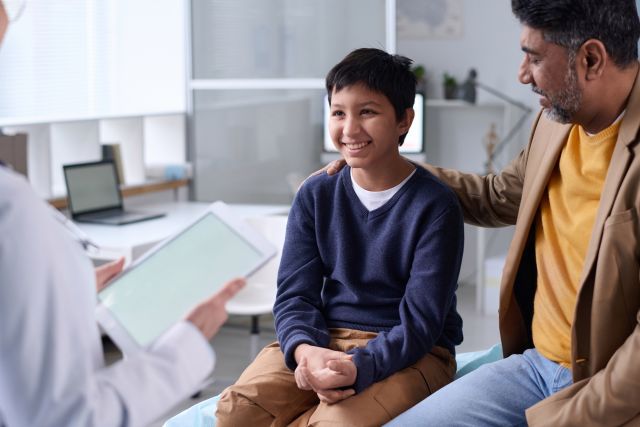Updated on July 9, 2024.
The human papillomavirus (HPV) is the most common sexually transmitted infection (STI) in the United States. Nearly everyone who is sexually active will contract this virus at some point in their lives, according to the Centers for Disease Control and Prevention (CDC).
HPV is also potentially dangerous. Each year, HPV causes cancer in roughly 36,000 people in the U.S.
Luckily, the HPV vaccine helps protect children from HPV-related cancers indefinitely. Since the vaccine began to be used in 2006, rates of infections with dangerous HPV types have gone down by 88 percent in teen girls and by 81 percent in young adult women. Rates of HPV-linked precancers in vaccinated adult women have gone down 40 percent.
The CDC strongly recommends that all children receive the vaccine in two doses. The first dose should ideally be given between ages 9 and 12 years, with the second dose 6 to 12 months after the first. The goal is to receive the vaccine far in advance of any possible exposure to HPV from sexual activity. But in 2022, fewer than 63 percent of tweens and teens were fully vaccinated against HPV.
Research has consistently shown that vaccines are much more likely to be accepted and received when healthcare providers (HCPs) recommend them to their patients. Yet despite the effectiveness of the HPV vaccine, multiple surveys and studies in different states have shown that some HCPs, including pediatricians and family physicians, still do not recommend the vaccine at patient visits.
Why is the HPV vaccine not more commonly recommended?
One possible explanation is that HCPs may be less informed than they should about the extent of the risks posed by HPV and the real benefits and effectiveness of the vaccine. What’s more, many parents are hesitant to have their children vaccinated against HPV.
Kari Harris, MD, is a professor in the department of pediatrics at the University of Kansas School of Medicine-Wichita and a pediatrician at KU Wichita Pediatrics. She shares some of the reasons and misconceptions parents may have that make them reluctant to have their child receive the vaccine—plus the reality about why your child needs to get the shot.
My child isn't sexually active
Reality: It's still important to get the vaccine early in life.
“Ideally, you want to get the vaccine before there is even the potential for the child to be exposed to the virus, because there is a high chance they could get it from their first sexual encounter,” says Harris. Plus, according to the American Academy of Pediatrics, the vaccine is more effective if given earlier in life. That’s in part because preteens’ immune systems seem to respond better to the vaccine than do those of older teens.
The vaccine isn't required at my child's school
Reality: That may be so, but it's not a reason to avoid the vaccine.
Unlike other vaccines, the HPV vaccine isn’t required to attend public school. Still, the CDC recommends that kids get the vaccine by age 11 or 12, just like the Tdap and meningitis vaccines and other childhood vaccines.
The HPV vaccine is for girls. My son doesn’t need it
Reality: The vaccination is equally important for boys and girls.
The HPV virus has typically been linked to cervical cancer, so it’s traditionally seemed less important for boys to receive the vaccine. “Now we know that HPV causes many cancers that affect men as well, particularly oropharyngeal cancer (a cancer of the back of the throat),” says Harris.
The vaccine isn't safe
Reality: The vaccine is safe and effective.
All three HPV vaccines—Gardasil 9, Gardasil, and Cervarix—have been extensively studied in clinical trials and are found to be safe by the CDC. (Only Gardasil 9 is used now in the U.S. because it’s more effective.)
Both the CDC and the U.S. Food and Drug Administration (FDA) continue to monitor vaccines even after they’ve been approved. More than 135 million doses of the vaccine were given between 2006 and 2021. Of those, only a minuscule number of people reported a serious reaction. Whether or not the vaccine actually caused these reactions is unclear, according to the CDC.
The bottom line on the HPV vaccine
If your child hasn’t been vaccinated against HPV, don't wait for your HCP to bring it up. "Parents should be proactive and ask their physician for it," says Harris.
Are you worried that it’s too late for your child to receive the vaccine? People who have not previously been vaccinated can still receive the vaccine up to age 26. They’d just need to receive three doses, as opposed to the two doses that are given for kids under the age of 15. In special circumstances, an HCP may even recommend getting the vaccine up until age 45.







